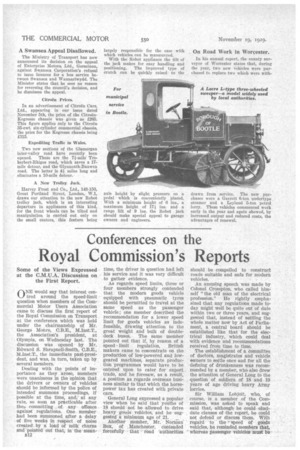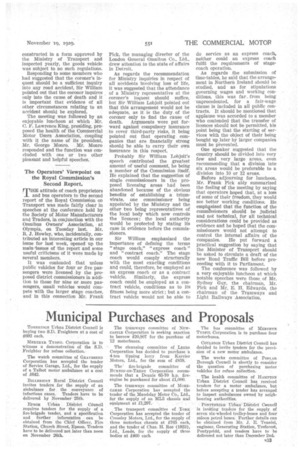Conferences on the
Page 46

Page 47

If you've noticed an error in this article please click here to report it so we can fix it.
Royal Commission's Reports
Some of the Views Expressed at the C.M.U.A. Discussion on the First Report.
rINE would say that interest cen tred around the speed-limit question when members of the Commercial Motor Users Association came to discuss the first report of the Royal Commission on Transport at the conference which was held under the chairmanship of Mr. George Monro, C.B.E., M.Inst.T., the Association's president, at Olympia, on Wednesday last. The discussion was opened by Mr. Edward S. Shrapnell-Smith, C.B.E., M.Inst.T., the immediate past-president, and was, in turn, taken up by several members.
Dealing with the points of importance as they arose, members were unanimous in the opinion that the drivers or owners of vehicles should be informed by the police of intended summons proceedings, if possible at the time, and, at any rate, so soon as practicable after thea committing of any offence against regulations. One member had been summoned after a delay of five weeks in respect of noise created, by a load of milkchUrns and pOinted out that; in the mean
B12 time, the driver in question had left his service and it was very difficult to gather evidence.
As regards speed limits, three or four members strongly contended that the modern goods vehicle equipped with pneumatic tyres should be permitted to travel at the same speed as the passenger vehicle; one member described the recommendation for a lower speed limit for goods vehicles as indefensible, drawing attention to the great weight and bulk of doubledeck buses. The same member pointed out that if, by reason of a
speed -limit regulation, British makers came to concentrate on the production of low-powered and lowgeared machines, separate production programmes would have to be entered upon to cater for export trade,' and he foresaw, as a result, a position as regards overseas business similar to that which the horsepower tax has created with private
Cars.
General Long expressed a popular view when he said that youths of 18 should not be allowed to drive heavy goods vehicles, and he suggested a minimum age of 21. . _Another member,Mr: Norman Box, of •,Manchester, contended forcefully that road authorities
should be compelled to construct • roads suitable and safe for modern vehicles.
An amusing speech was made by Colonel Crompton, who called himself "the old man of the electrical profession." He rightly emphasized that any regulations made today might well be quite out of date within two or three years, and suggested that, instead of settling the whole matter now by Act of Parliament, a central board should be established like that for the electrical industry, which could deal with evidence and recommendations received from time to time.
The establishment of .a committee of doctors, magistrates and vehicle owners to settle once and for all the defining of drunkenness was recommended by a member, who also drew the attention of General Long to the question of soldiers of 18 and 19 years of age driving heavy Army lorries. .
Sir William Lobjoit, who, of course, is a member of the Commission, was asked to speak and said that, although he could elucidate clauses of the report, he could not defend or discuss them. With regard to the -speed of goods vehicles, he reminded members that, ' whereas &sseng-er vehicles must be•
constructed in a form approved by the Ministry of Transport and inspected yearly, the goods vehicle was subject to no such regulations.
Responding to some members who had suggested that the coroner's inquest should be a sufficient inquiry into any road accident, Sir William pointed out that the coroner inquires only into the cause of death and it is important that evidence of all other circumstances relating to an accident should be explored.
The meeting was followed by an enjoyable luncheon at which Mr. C. F. Lawrence King, presiding, proposed the health of the Commercial Motor Users Association, coupling with it the name of its president, Mr. George Monro. Mr. Monro responded and the function was concluded with one or two other pleasant and helpful speeches.
The Operators' Viewpoint on the Royal Commission's Second Report.
THE attitude of coach proprietors and bus operators to the second report of the Royal Commission on Transport was made fairly clear in speeches at the conference held by the Society of Motor Manufacturers and Traders, in conjunction with the Omnibus Owners' Association, at Olympia, on Tuesday last. Mr. R. J. Howley, who, incidentally, contributed an interesting article in our issue for last week, opened up the main issues of the report and some useful criticisms of it were made by several members.
It was contended that unless public vehicles for four or Rye passengers were licensed by the proposed district commissioners in addition to those for nine or more passengers, small vehicles would compete with the larger stage coaches, and in this connection Mr. Frank Pick, the managing director of the London General Omnibus Co., Ltd., drew attention to the state of affairs in Detroit.
As regards the recommendation for Ministry inquiries in respect of all accidents involving loss of life, it was suggested that the attendance of a Ministry representativeat the coroner's inquest should suffice, but Sir William Lobjoit pointed out that this arrangement would not be adequate, as it is the duty, of the coroner only to find the cause of death. Arguments were put forward against compulsory insurance to cover third-party risks, it being pointed out that operating companies that are financially strong should be able to carry their own insurance in this respect.
Probably Sir William Lobjoit's speech contributed the greatest amount of useful comment, he being a member of the Commission itself, He explained that the suggestion of single commissioners in the proposed licensing areas had been abandoned because of the obvious benefits of establishing a triumvirate, one commissioner being appointed by the Ministry and the other two being representatives of the local body which now controls the licences; the local authority would be protected by stating its case in evidence before the commissioners.
Sir William emphasized the Importance of defining the terms "stage coach," "express Coach" and "contract coach." The stage coach would comply structurally with the most exacting conditions and could, therefore, be employed as an express coach or as a contract • vehicle. Similarly, the express coach could be ,employed as a contract vehicle, conditions as to its fitness being more strict ; but a contract vehicle would not be able to do service as an express coach, neither could an express coach fulfil the requirements of stagecoach operation.
As regards the submission of time-tables, he said that the arrangement in Northern Ireland should be• studied, and as for stipulations governing wages and working conditions, this was far_ from being unprecedented, for a fair-wage clause is included in all public contracts. It should be mentioned that applause was accorded to a member who contended that the transfer of licences should not be permitted, his point being that the starting of services with the object of their being bought up later by larger companies must be prevented.
One speaker suggested that the country should be divided into very few and very large areas, even recommending that a division into six areas would be preferable to a division into 10 or 12 areas.
Before adjourning for luncheon, Mr. Frank Pick ably summarized the feeling of the meeting by saying that operators hoped that, at a loss of some of their freedom, they would see better working conditions. He emphasized that the function of the commThsioners should be judicial and not technical, for all technical considerations could be provided as evidence and he hoped that the commissioners would not attempt to control the internal affairs of the companies. He put forward a practical suggestion by saying that the Minister of Transport should be asked to circulate a draft of the new Road Traffic Bill before proceeding with it to Parliament.
The conference was followed by a very enjoyable luncheon at which notable speeches were those of Mr. Sydney Guy, the chairman, Mr. Pick and Mr. E. H. Edwards, the chairman of the Tramw6ys and Light Railways Association,




















































































































